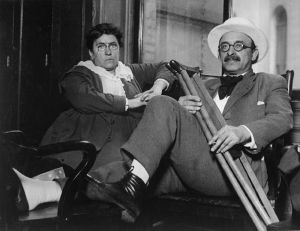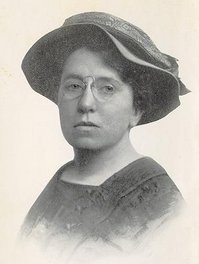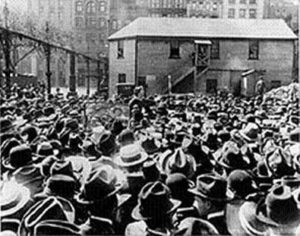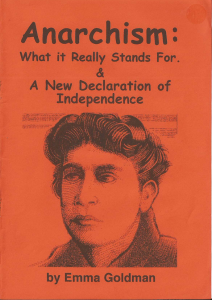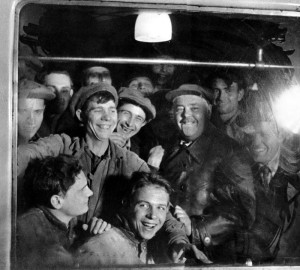by Emma Goldman
Taken from The Russian Tragedy (A Review and An Outlook) (Berlin: Der Syndikalist, 1922).
To write a biographic sketch of even an ordinary man within the limited space at my disposal would be difficult. But to write about one whose personality is so complex and whose life so replete with events as that of Alexander Berkman, is almost an insurmountable task. To do justice to such a rich and colorful subject one must not be so limited by space as I am. Above all, one should be removed, in point of time and distance, from the life to be portrayed. Which is not the case in the present instance.
Continue reading A Sketch of Alexander Berkman
Tag Archives: Emma Goldman
On the shooting of Henry Clay Frick
by Alexander Berkman
From ‘Living My Life’
by Emma Goldman
“It was May 1892. News from Pittsburg announced that trouble had broken out between the Carnegie Steel Company and its employees organized in the Amalgamated Association of Iron and Steel Workers. It was one of the biggest and most efficient labour bodies of the country, consisting mostly of Americans, men of decision and grit, who would assert their rights. The Carnegie Company, on the other hand, was a powerful corporation, known as a hard master. It was particularly significant that Andrew Carnegie, its president, had temporarily turned over the entire management to the company chairman, Henry Clay Frick, a man known for his enmity to labour. Frick was also the owner of extensive coke fields, where unions were prohibited and the workers were ruled with an iron hand.”
“The high tariff on imported steel had greatly boomed the American steel industry. The Carnegie Company had practically a monopoly of it, and enjoyed unprecedented prosperity. Its largest mills were in Homestead, near Pittsburgh, where thousands of workers were employed, their tasks requiring long training and skill. Wages were arranged between the company and the union, according to a sliding scale based in the prevailing market price of steel products. The current agreement was about to expire, and the workers presented a new wage schedule, calling for an increase because of the higher market prices and enlarged output of the mills.”
Continue reading On the shooting of Henry Clay Frick
La tragedia de la emancipación de la mujer – Emma Goldman
Escrito por Emma Goldman en 1906.
Comenzaré admitiendo lo siguiente: sin tener en cuenta las teorías políticas y económicas que tratan de las diferencias fundamentales entre las varias agrupaciones humanas; sin miramiento alguno para las distinciones de raza o de clase, sin parar mientes en la artificial línea divisoria entre los derechos del hombre y de la mujer, sostengo que puede haber un punto en cuya diferenciación misma se ha de coincidir, encontrarse y unirse en perfecto acuerdo.
Continue reading La tragedia de la emancipación de la mujer – Emma Goldman
PRISONS: A SOCIAL CRIME AND FAILURE
EMMA GOLDMAN (1911)
IN 1849 Feodor Dostoyevsky wrote on the wall of his prison cell the following story of The Priest and the Devil:
Continue reading PRISONS: A SOCIAL CRIME AND FAILURE
La prostitución, por Emma Goldman
Nuestros reformistas hicieron de repente un gran descubrimiento: la trata de blancas. Los diarios se llenaron de exclamaciones y hablaron de cosas nunca vistas e increíbles, y los fabricantes de leyes se prepararon para proyectar un haz de leyes nuevas a fin de contrarrestar esos horrores.
Continue reading La prostitución, por Emma Goldman
Conversando con Emma Goldmann. Entrevista en 1937 sobre la situación española
Entrevista a Emma Goldmann en 1937 sobre la situación de los anarquistas en la Guerra Civil publicada en la revista Il Risveglio Anarchico.
Continue reading Conversando con Emma Goldmann. Entrevista en 1937 sobre la situación española
Anarchism: What it really stands for & A New declaration of independence
Anarchism: What it really stands for and A New Declaration of Independence by Emma Goldman.
Continue reading Anarchism: What it really stands for & A New declaration of independence
Red Emma Speaks: An Emma Goldman Reader (Edited by Alix Kates Shulman)
Alix Shulman has provided a truly elegant collection of Emma Goldman’s speeches and writings. Shulman’s introductions also display a rare and genuine knowledge of anarchist political thought. In her comments, Kates shows the relevance of Goldman’s life and work for the contemporary world.
Continue reading Red Emma Speaks: An Emma Goldman Reader (Edited by Alix Kates Shulman)
There Is No Communism in Russia
Emma Goldman (1935)
I.
Communism is now on everybody’s lips. Some talk of it with the exaggerated enthusiasm of a new convert, others fear and condemn it as a social menace. But I venture to say that neither its admirers—the great majority of them—nor those who denounce it have a very clear idea of what Bolshevik Communism really is.
Continue reading There Is No Communism in Russia
A Sketch of Alexander Berkman
by Emma Goldman
Taken from The Russian Tragedy (A Review and An Outlook) (Berlin: Der Syndikalist, 1922).
To write a biographic sketch of even an ordinary man within the limited space at my disposal would be difficult. But to write about one whose personality is so complex and whose life so replete with events as that of Alexander Berkman, is almost an insurmountable task. To do justice to such a rich and colorful subject one must not be so limited by space as I am. Above all, one should be removed, in point of time and distance, from the life to be portrayed. Which is not the case in the present instance.
Continue reading A Sketch of Alexander Berkman

